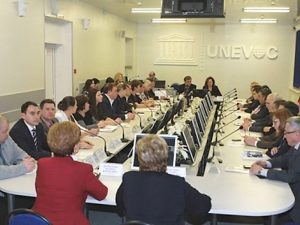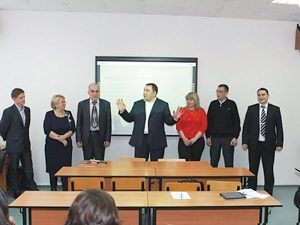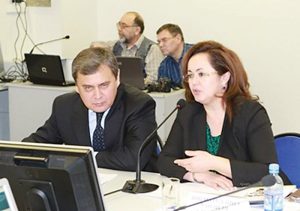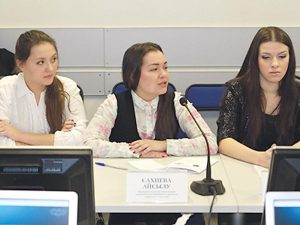
A roundtable on “Legal Education as a factor of youth civic engagement” took part on December 10, 2014 — the International Day of Human Rights — on the initiative of the Agency of Educational Technologies UNESCO-UNEVOC Center. The discussed issue was very relevant. Formation of a civic life position of young people and their wish to participate in public decision-making — is the key to national security. Exactly this age group is the most socially active part of the population. It is the main electoral reserve society: one in four potential voters is a young person aged up to 30 years.
The organizers of the roundtable were the Central Election Commission of the Republic of Bashkortostan and the Bashkir Institute of Social Technologies — UNESCO-UNEVOC Centre in the Russian Federation.
 Before the round Table there was a seminar-training “Election institute in modern Russia: Theory and Practice.” For its members — chairmen and members of territorial and precinct election commissions of the Republic of Bashkortostan — K.I. Smirnova, head of the psychological service of the Bashkir Institute of Social Technologies, conducted psychological testing “Overcome strategy and prevention of difficult situations during the work of election commissions”. And then the head of conciliation Technology Agency of the Bashkir Institute of Social Technologies, a professional mediator M.A. Belyaev and senior lecturer in Civil Law and Procedure R.M. Tukhvatshin conducted a training “Prevention Technology and conflict resolution in the electoral process”.
Before the round Table there was a seminar-training “Election institute in modern Russia: Theory and Practice.” For its members — chairmen and members of territorial and precinct election commissions of the Republic of Bashkortostan — K.I. Smirnova, head of the psychological service of the Bashkir Institute of Social Technologies, conducted psychological testing “Overcome strategy and prevention of difficult situations during the work of election commissions”. And then the head of conciliation Technology Agency of the Bashkir Institute of Social Technologies, a professional mediator M.A. Belyaev and senior lecturer in Civil Law and Procedure R.M. Tukhvatshin conducted a training “Prevention Technology and conflict resolution in the electoral process”.
The roundtable participants were members of territorial and precinct election commissions of the Republic of Bashkortostan, representatives of educational institutions (Ufa), as well — online — D.I. Panshin, a member of the Central Election Commission of Russian Federation (Moscow); members of the territorial election commission of Sterlitamak, teachers and students of Sterlitamak branch of Bashkir State University, members of the territorial election commission of the municipal district Tuymazinsky District and teachers and students Tuimazy State College of Law.
 H.A. Valeev, chairman of the Central Election Commission of the Republic of Bashkortostan, Doctor of Political Sciences, and T.A. Nigmatullina, head of the UNESCO-UNEVOC Centre Director of our Institute, Doctor of Political Sciences were the moderates.
H.A. Valeev, chairman of the Central Election Commission of the Republic of Bashkortostan, Doctor of Political Sciences, and T.A. Nigmatullina, head of the UNESCO-UNEVOC Centre Director of our Institute, Doctor of Political Sciences were the moderates.
The Chairman of the Central Election Commission of the Republic has named one of the urgent problems of the modern Russian society the low social and political activity of Russians. He identified a common aim — education of young generation, socially active and appropriate modernity and briefly analyzed the participation of young voters in the early elections of the President of the Republic of Bashkortostan in the autumn of this year, where their participation was 63,9% (compared to the elections in 2013 — 49,4%). “But there were times — said Haidar Arslanovich — when the youth’s election activity was more than 80%”.
Tanzilya Altafovna stopped at the Children’s Public Legal Chamber, which established in our Institute two years ago. “Today, members of the Chamber not only learn the basics of law, but also are engaged in legal education of their peers, conduct social events, focusing adults on “children’s” problems. For example, an inspection of children’s sports grounds state in the city, a survey of the Republic’s pupils on school nutrition and many other things.
 Aisylu Sakhieva, chairman of the Children’s Public Legal Chamber, and curator of the Children’s Chamber S.S. Angeli told about “Day V” in schools in Ufa, as members of the Children’s Chamber elected “President of the Planet” — according to the rules of the electoral law. Video about these events, was filmed and mounted by the head of our press center Denis Salimgareev, the Round Table participants watched with interest before the meeting.
Aisylu Sakhieva, chairman of the Children’s Public Legal Chamber, and curator of the Children’s Chamber S.S. Angeli told about “Day V” in schools in Ufa, as members of the Children’s Chamber elected “President of the Planet” — according to the rules of the electoral law. Video about these events, was filmed and mounted by the head of our press center Denis Salimgareev, the Round Table participants watched with interest before the meeting.
The round table was interesting and effective. Each of the participants and all together defined a set of the most effective technologies to improve legal literacy of children and youth, their electoral activity and social responsibility.

 December 11th, 2014
December 11th, 2014  ALINA B.
ALINA B.  Posted in
Posted in